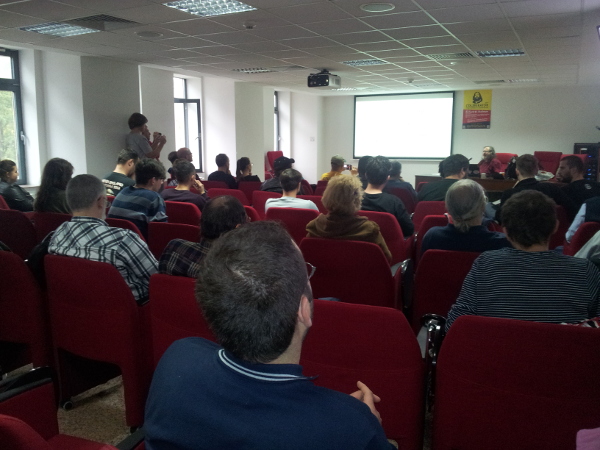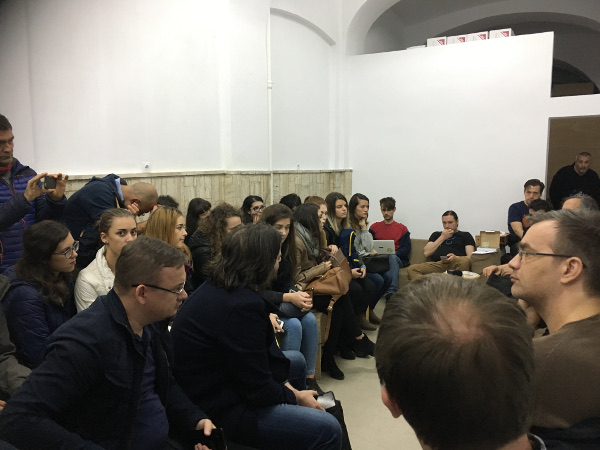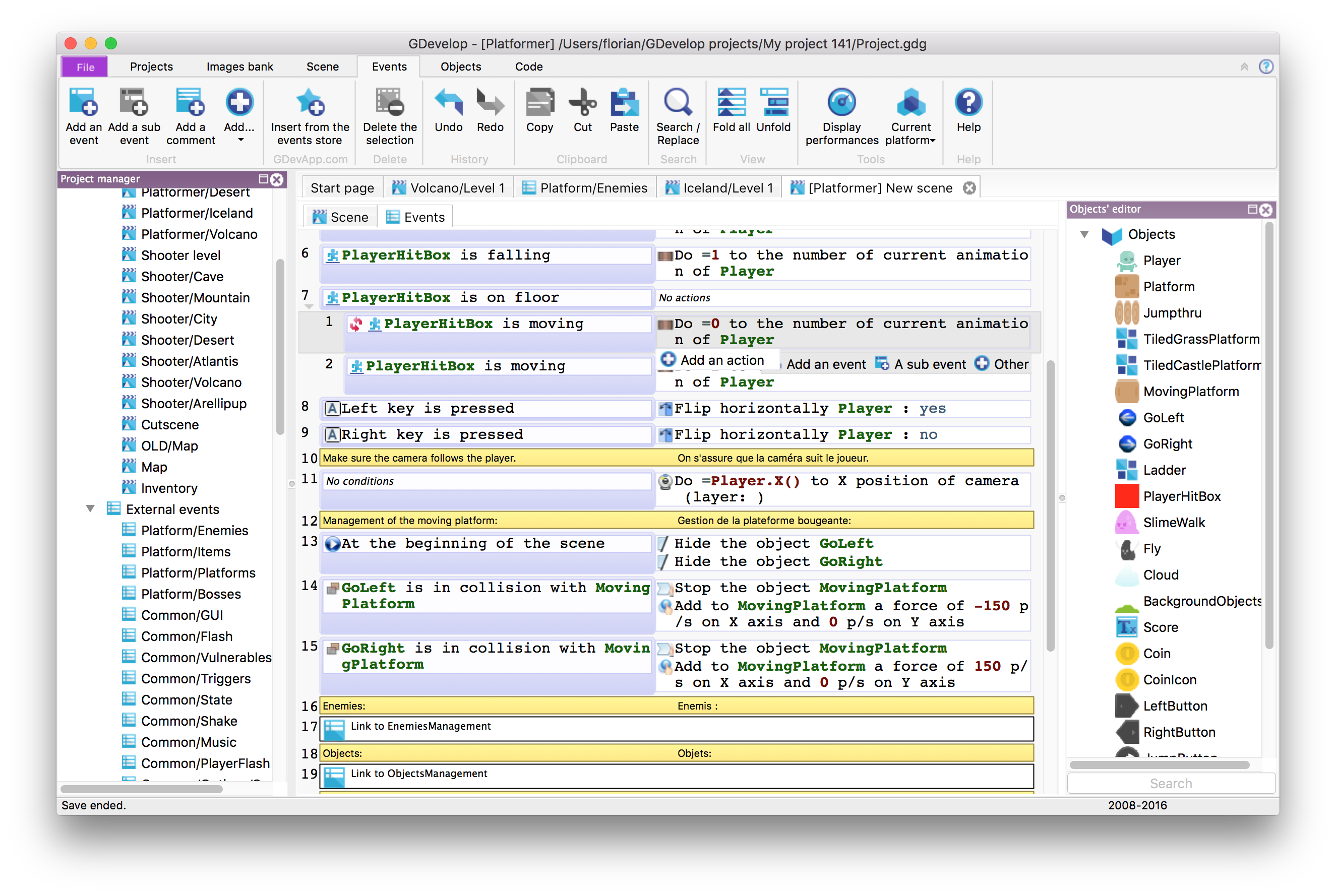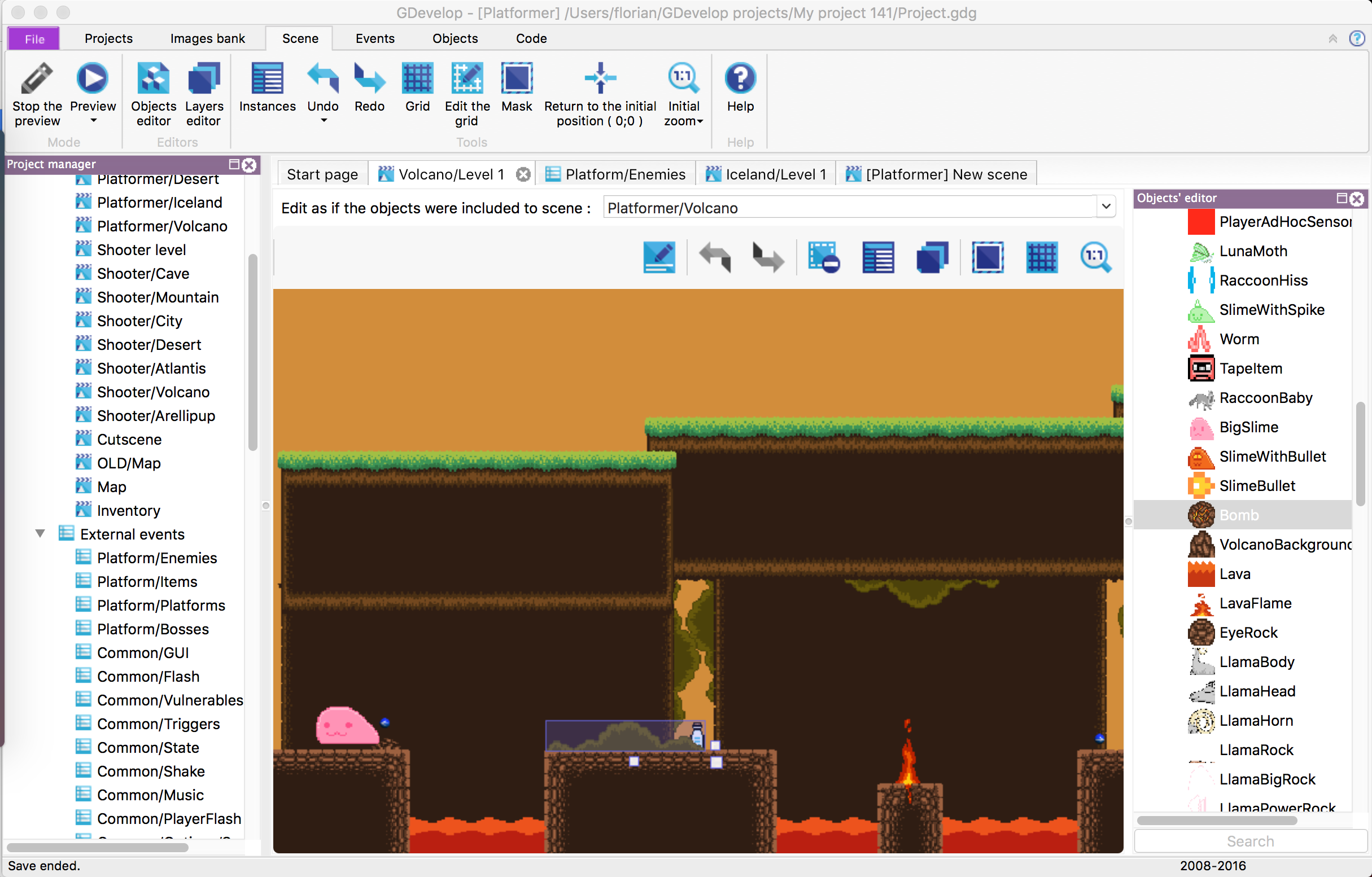October 2017: RMS photos from Romania
mardi 31 octobre 2017 à 19:15Free Software Foundation president Richard Stallman (RMS) was in Romania this month, to deliver the keynote speech at the Fundația Ceata-organized Coliberator 2017 conference (2017-10-07-08), at the Biblioteca Centrală a Universității Politehnica din București, in Bucharest, on October 7th, to about 140 people. While there, he also spoke to students at a GNU/Linux Install Fest.

(Photo under CC BY-SA 3.0 and courtesy of Fundația Ceata.)
To coincide with the conference, the foundation's partners organized satellite events. In Iași, on October 9th, at the Universitatea Tehnică "Gh. Asachi" din Iași, RMS met with Tranzit's diverse community of activists, artists, political science students, and software developers.

(Photo under CC BY-SA 3.0 and courtesy of Florin Bobu.)
And in Timișoara, about 450 people packed the auditorium of the Universitatea Politehnica Timișoara, in an event co-organized by the Computer Science Department, to hear him give his speech “Free Software and Your Freedom”:



(Photos under CC BY-SA 3.0 and courtesy of Titus Bălan.)
Thank you to Tiberiu-Constantin Turbureanu and to everyone else who made this appearance possible!
Please fill out our contact form, so that we can inform you about future events in and around Bucharest, Iași, and Timișoara. Please see www.fsf.org/events for a full list of all of RMS's confirmed engagements, and contact rms-assist@gnu.org if you'd like him to come speak.
The Licensing and Compliance Lab interviews Florian Rival of GDevelop
lundi 30 octobre 2017 à 20:32 |
My name is Florian Rival, I'm a software engineer working in Paris. I'm working on various projects, ranging from large scale Web apps to innovative mobile apps, and I'm also creating games in my spare time. GDevelop is a piece of game creator software allowing anyone to create games. The editor is built to be intuitive and used by beginners or advanced game makers. In particular, no programming skills are required: all the game logic can be made using a visual event system that is easy to learn and expressive enough to build any game you can imagine.
 |
Why did you start GDevelop?
I've always been fond of software that allows people to create things without having to spend a lot of time learning advanced programming. When I was young, I used a game-making software similar to GDevelop, and this is what got me into programming later. Since then, I've always been eager to provide the same kind of software to allow anyone to create games. I'm also quite fond of video games, so making software to create video games is a natural fit for me!
How are people using it?
Most people are making their first step in game creation and programming using GDevelop, mostly to have fun and see how it works. A few people are able to create advanced games, and I'm quite proud when I discover a really enjoyable game made with GDevelop.
 |
What features do you think really sets GDevelop apart from other game development systems?
It is feature-rich, which allows for a multitude of uses. The event system is a way to create the game rules and logic without having to learn how to use traditional programming language. It's easier to get started with events as you search in a list of all available actions and conditions that you can use, and apply them on the objects of your game. And it's still powerful enough to re-create the same things that you can do with programming -- so that no user of GDevelop is forced to switch to a programming language when the game is becoming a bit complex.
Why did you choose the GPLv3 as GDevelop's license?
I've spent a huge amount of time designing the editor, and I wanted to be sure that anybody improving and developing the editor will make their contribution available to anyone else with the same license.
How can users (technical or otherwise) help contribute to GDevelop?
First, developers can help in designing or improving the editor or the game engine (written in C++ and Javascript) on https://github.com/4ian/GD. I'm developing a new, improved editor, and any developer knowing a bit of JavaScript should be able to quickly set it up and contribute! The best way for other users is simply to download GDevelop and get involved in the community. In particular, we need a lot of tutorials to help beginners to get started and build advanced games! We already have some tutorials, but more are better.
What's the next big thing for GDevelop?
The editor is being re-written so that it's built on new Web technologies, enabling it to be fully cross-platform (GNU/Linux, macOS, Windows) and even used directly from a Web browser in the near future. It's a good way for me to think again about the whole interface and to simplify it. I'd like to build an ecosystem around GDevelop, this should help even more people to try game creation and see how easy it can be once you've learned a few concepts, and we have a road map.
*Enjoy this interview? Check out our previous entry in this series, featuring David Rosca of QupZilla.
The logo and screenshots are used with permission of Florian Rival.